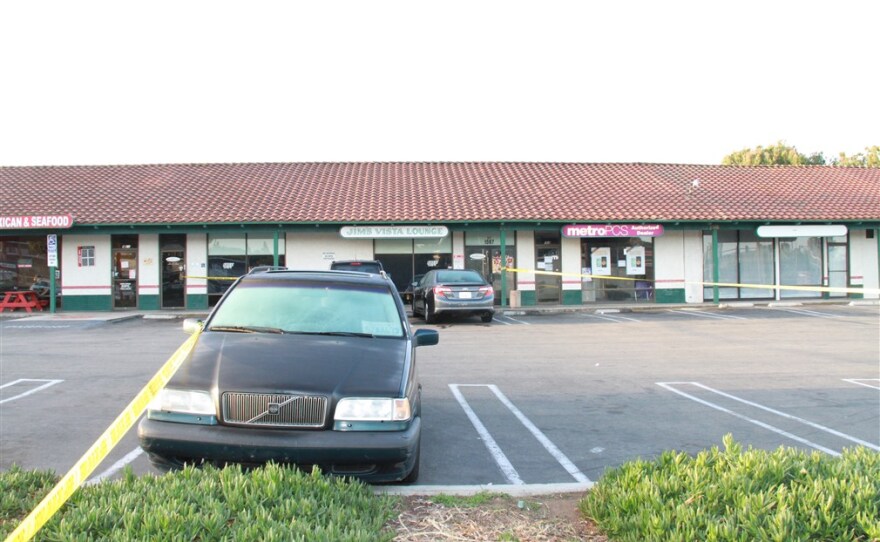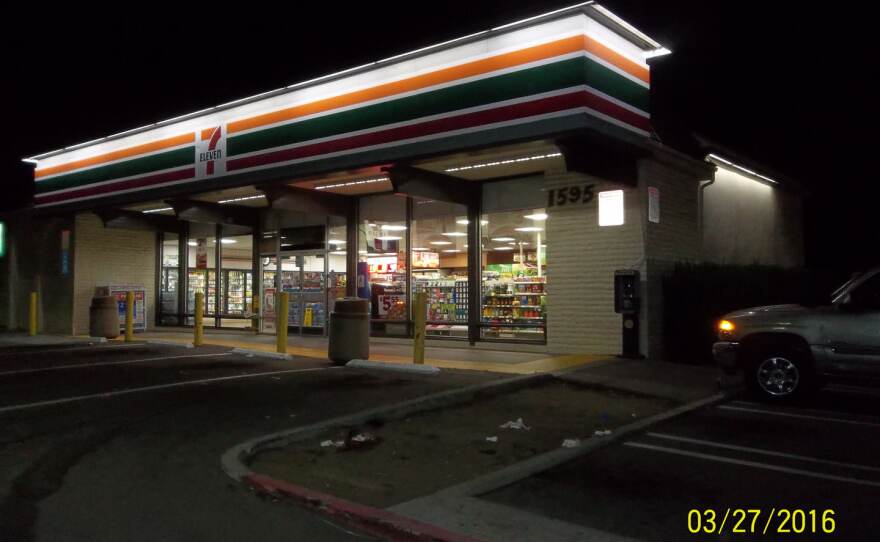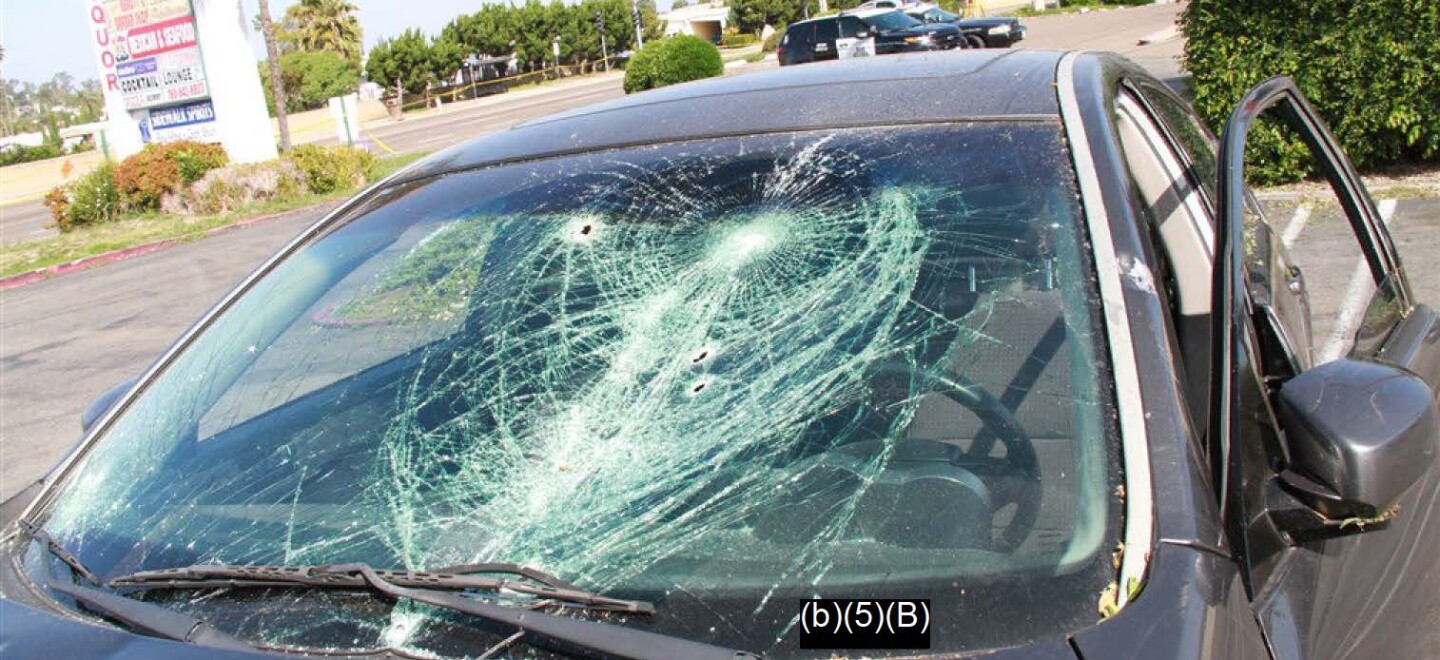Part three in a three-part series. Read part one here and part two here.
It was an altercation that quickly spiraled out of control.
In the early morning hours on a Sunday in March 2016, Jose Blanco had gotten in a fight outside a 7-Eleven in Vista. At that moment, Jason Phillips and a few of his co-workers had just emerged from a bar at the other end of the parking lot.
The men charged across the parking lot toward the fracas. Seeing them, Blanco jumped into his car and tried to flee.
Blanco threw the car in reverse, hitting one of the men behind him. When he drove forward, Phillips ended up on the car’s hood. He pulled out a gun and fired five shots through the windshield. Blanco was hit multiple times.
Only after Phillips and his colleagues pulled Blanco from the car did he begin to realize they were police, he later told investigators.
The chain of events that culminated with the shooting at 2 a.m. that Sunday morning began with a retirement party for a San Diego County sheriff’s sergeant the night before, according to a review of the department’s internal police reports on the incident.
Phillips, a sheriff's detective, had been drinking heavily at the party and then gone to the bar afterwards.
RELATED: Search the police records database
Blanco, an undocumented immigrant, was ultimately charged with multiple counts of assault, including assault with a deadly weapon for hitting the deputies with his car. He pleaded guilty to assault and was then deported to Mexico.
Meanwhile, Phillips was not charged with a crime — he was reassigned and suspended without pay for four days for violating department policy. The violation was for carrying a gun while he was drinking.
Few face punishment
That Phillips was punished at all is rare in police use-of-force cases, according to a KPBS review of more than 300 internal police records that have been released so far by local law enforcement under SB 1421, a California law that requires these records be made available to the public.
This case involving Phillips is one of just five that resulted in any punishment for the officer, according to the records KPBS reviewed. A National City officer was fired after shooting an unarmed man and three others were suspended, two for accidentally shooting someone and one for repeatedly punching a woman during an arrest.
Only one officer in San Diego County, sheriff’s Deputy Aaron Russell, has ever been charged for shooting someone. In May 2020, he was charged with murder after he shot a mentally ill man who escaped from a police vehicle and was running away.
When officers do shoot or otherwise use force, the investigations they face are substantially different from those of suspects. They are subject to interviews with their lawyers present conducted by fellow officers. Experts familiar with these interviews say the officers conducting them often tread lightly when questioning their colleagues.
“It is the fox watching the henhouse,” said Dave Myers, a retired sheriff’s commander who ran unsuccessfully in 2018 to unseat Sheriff Bill Gore. “If the intention is a fair and impartial fact finding mission, it’s flawed, and it’s intended to benefit the law enforcement agency.”
“It is the fox watching the henhouse. If the intention is a fair and impartial fact finding mission, it’s flawed, and it’s intended to benefit the law enforcement agency.”— Dave Myers, retired sheriff’s commander
The Sheriff’s Department would not agree to an interview for this story.
Phillips’ lawyer Richard Pinckard, who often represents police officers in use-of-force cases, said it’s unfair to insinuate that the incidents aren’t properly investigated.
The officers are first investigated by their own department’s homicide division, then internal affairs and the District Attorney’s Office. After that, Pinckard said, they can face scrutiny from federal and state attorneys general, the FBI, commissions on police practices, civilian review boards, the media and the public.
He said the two separate in-depth investigations into Phillips’ actions were appropriate under the circumstances.
“This incident was thoroughly investigated by the Sheriff’s Department and then independently investigated by the District Attorney’s Special Operations division,” Pinckard wrote in an email to KPBS. “The D.A. concluded that Deputy Phillips’ use of lethal force was legally justified under prevailing law, given the totality of the circumstances — which is why Deputy Phillips was not charged.”

Friendly questions
However, Myers and other criminal justice reform advocates say the structure of use-of-force investigations are in the officers’ favor. Records show that when Phillips was interviewed by investigators from the sheriff’s homicide department, he had an attorney from the police union with him and did not face harsh questioning.
At one point, one detective asked, “How many hours sleep did you get?”
“Maybe six,” Phillips replied.
“Is that normal for you?” the detective asked.
“Yeah, I have two little kids,” Phillips said.
“OK, that’s a lot,” the detective told him.
Then they moved on to his drinking, which had started at 9:30 p.m. on Saturday at the retirement party at the Elks Lodge in Vista. Phillips said he had two to three shots of tequila, and two to three beers, and a detective asked what size beers he had drank.
“I think it's probably 12 to 16 ounces, right? Depending on the cup,” Phillips said.
“Were the cups red?” the detective asked.
“They were red,” Phillips replied.
Then came the trip to the bar.
“If anything, at the bar, I was becoming more and more sober,” Phillips told the detective. “The drinking was mainly behind me.”
“You say you're becoming more sober,” the detective said. “Does that mean you were intoxicated before?”
“I'm sorry?” Phillips said.
“The way you said it, I think I know what you meant, but I just want to clarify,” the detective said.
“My drinking had stopped significantly earlier in the evening,” Phillips said. “I'm not sure how to word it.”
The other detective cut in.
“Let me ask you the question,” he said. “I think what he's getting at, was at any time during the evening, did you feel that you were intoxicated?”
“No,” Phillips said.
“That’s exactly what I was getting at,” the first detective said, and they both laughed.
Phillips told Sheriff Department investigators he was “a little cloudy as to whether I jumped as the vehicle was coming straight at me, or if it hit me and I ended up on the hood.” Either way, he said he feared for his life and that of a fellow deputy.
“I knew I was going to either fall off the vehicle and be crushed or he was going to accelerate at a high rate of speed onto East Vista Way, and I would be badly injured,” Phillips said. “And at that point, I discharged my revolver through the windshield, trying to stop him from driving off or killing Deputy Garcia.”
“Okay, good,” the detective said. “I want to back up. That's a great statement.”
Anne Rios, a defense attorney who often represents people subject to force by police, said officers get better treatment than the people they injure.
“Most often police officers have a presumption of innocence or a presumption of fair play, a presumption of a necessary reason for why they exerted force, yet victims don't have that presumption of innocence,” Rios said. “Which is ironic, since it really is the defendant or the accused that actually does have a constitutional right to a presumption of innocence.”
Myers, the retired sheriff’s commander, said he’s undergone two internal affairs investigations for shootings he was involved in. Neither were thorough, he said.
“Most of the contacts that take place are one cop, one person, and if they have different stories then it’s just called an unfounded complaint, and there’s no follow up,” he said. “There’s no desire to look at physical evidence, is the allegation of excessive force corroborated by physical marks on the person, things like that.”

A different approach
The same morning that Phillips sat with his lawyer and detectives in a Sheriff’s station, Blanco was having a different kind of conversation. He was being treated in the hospital for his gunshot wounds when detectives arrived to interview him. Blanco had no lawyer and the detectives repeatedly challenged him, telling him he wasn’t telling the truth.
This interview was done in Spanish, because Blanco did not speak fluent English.
“What I want you to tell me the truth is what happened when you were in the car, how did you hit those people?” one detective said. “Whether you meant to or not, but how did you hit them? Because you're not going to tell me you don't remember. I know you're not a liar, now is not the time to tell lies, how did you hit them?”
“Well, I remember that I just went backwards and then forward but I don't remember seeing someone in front of me,” Blanco said.
“Okay, and do you remember if you hit someone when you backed up?” the detective asked.
“I swear to you, I don't, I don't remember, hitting anyone in reverse, no,” Blanco said.
“How is that possible?” the detective said. “I mean, you're not telling me, what are you afraid of, what are you hiding?”
Blanco also repeatedly insisted he did not know Phillips and the other men were police.
“Maybe you didn't believe them, if you didn't believe them that's something else, but didn't they yell something like that they were cops?” the detective asked.
“No, no, I didn't hear them say that,” Blanco said. “I was scared.”
The detective said he’d reviewed security camera footage from 7-Eleven, and that he could tell Blanco was lying.
“If you want to check it in the video, that's when they opened the door and tried to take me out, they wanted to take me out but I didn't know who they were,” Blanco said again. “Had I known they were police officers I would have gone to the ground.”
Blanco’s blood alcohol level was 0.05, below the legal limit, though the measurement was taken at the hospital after the shooting. Phillips and the other deputies never had their blood alcohol levels tested.
The detective then told Blanco he’s “logically under arrest right now.”
“And what are the charges?” Blanco asked.
“You assaulted three people with a car,” the detective said. “In other words, you assaulted in the sense that you tried to harm them by using the car as a weapon.”
Blanco argued that he was trying to defend his wife, and that he thought the people surrounding his car were the same people he was fighting with outside the 7-Eleven.
“If I had known they were cops, I've seen so many stories of people being shot and killed, do you think I want to die?” Blanco said. “If I had known they were police, I would have stopped right away, I didn't want them to shoot me, who would want that?”
But Blanco’s fate was sealed. A few months later he pleaded guilty and was deported.

Rios said the way this case was handled is similar to the vast majority of use-of-force cases.
“Whenever there is an investigation against a police officer, they're provided with an attorney, and they know better than to speak to [internal affairs] without having an attorney present,” she said. Yet, she said, the people on the other side of the case often “are tricked or are convinced to speak to officers without having an attorney present.”
That is the case even though police officers are rarely charged, she said.
Pinckard pointed out that suspects have the right, under the Fifth Amendment of the U.S. Constitution, not to answer any questions, but law enforcement officers could be fired for not answering questions during internal affairs investigations.
“In fact, the officer will be specifically admonished that they must answer all questions and they will be given a direct order to do so, or be subject to termination for insubordination,” he said.
“In fact, the officer will be specifically admonished that they must answer all questions and they will be given a direct order to do so, or be subject to termination for insubordination.”— Richard Pinckard, law enforcement attorney
New legislation
A new state law, AB 1506, passed in 2020, now requires the California Attorney General’s office to investigate officers who shoot unarmed suspects. And another bill currently before the state Legislature, AB 594, would prevent a law enforcement agency from investigating its own officers who shoot people.
Pinckard said if that bill passes, shootings by a San Diego Police Department's officer would be investigated by the Sheriff’s Department, and vice versa. San Diego Police would also likely investigate shootings by officers at other local agencies.
“This process is directly responsive to the unfounded myth that agencies are less than objective when investigating their own personnel,” he said.
But Rios, the defense attorney, said she would like to see both increased scrutiny of officers and better protections for people who are shot by police. She thinks that would lead to greater community trust in the police.
“I think that it's important that we scrutinize the people who work for us,” she said. “In what world would an employer allow for their employee to do things recklessly and with wild abandon? That wouldn't happen. These are officers that work on behalf of the people of San Diego. I would argue it’s not just right but a duty to investigate their behavior.”








